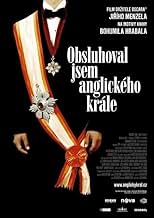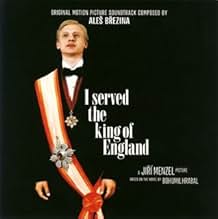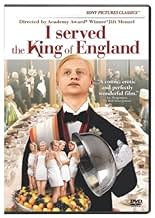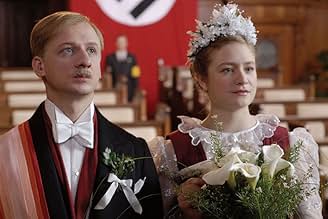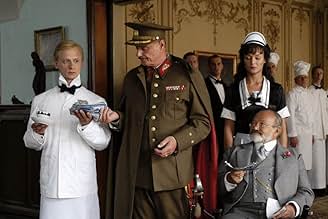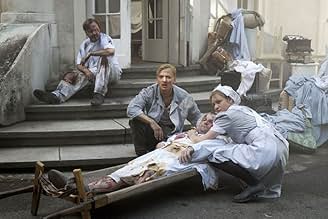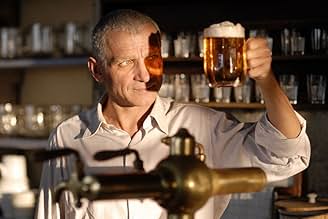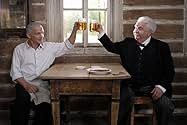Ich habe den englischen König bedient
Originaltitel: Obsluhoval jsem anglického krále
IMDb-BEWERTUNG
7,3/10
8416
IHRE BEWERTUNG
Ein Blick auf das glamouröse Leben in einem altehrwürdigen Prager Hotel.Ein Blick auf das glamouröse Leben in einem altehrwürdigen Prager Hotel.Ein Blick auf das glamouröse Leben in einem altehrwürdigen Prager Hotel.
- Regie
- Drehbuch
- Hauptbesetzung
- Auszeichnungen
- 12 Gewinne & 13 Nominierungen insgesamt
Empfohlene Bewertungen
While filming a novel is always difficult.. I think this film captures the spirit of the novel.. one man' life as he succeeds and fails and survives and never seems to be really touched by the world events happening around him (the story starts in 1920's and ends mid-1960's) The actors are perfectly cast, especially the two actors playing Jan Dite. The cinematography is wonderful, as is the music. I have read the novel and I live in the Czech Republic, so I have familiarity with both the story and the culture, but I think the story is universal enough for all audiences to enjoy this film.
This is one of the biggest budget Czech films ever and you can see ALL of the money on the screen, costumes, sets and locations (including the beautiful Hotel Parziz in Prague, which is unchanged from when it was built!)
highly recommend this film to anyone who loves melancholy, sweet stories with a bit of political commentary thrown in for good measure....
This is one of the biggest budget Czech films ever and you can see ALL of the money on the screen, costumes, sets and locations (including the beautiful Hotel Parziz in Prague, which is unchanged from when it was built!)
highly recommend this film to anyone who loves melancholy, sweet stories with a bit of political commentary thrown in for good measure....
Maybe, like me, you don't know that much about the history of the country wherein sits Prague, and its remnants of regal splendour. After watching I Served the King of England, you will know more. A lot more. The politics. The humour. The cultures. The aspirations. The troubled relations with neighbouring empires. And the incredible resilience of its individuals.
I Served the King of England is very ambitious. It condenses an epic novel into two hours and squeezes in more styles than a catwalk. There are nods to the wit of Charlie Chaplin. The visual eulogies of Peter Greenaway. Penitentiaries, bars, brothels, woods, invading armies. All are collected in a dizzying montage as Jan Díte reviews the highs and lows of his life and loves in flashback.
He has just been released from Prague Correctional Facility, having served almost 15 years. He is also in rather humble circumstances. This seems to contrast with his lifelong and apparently successful ambition to become a millionaire. The first half of the film has a theatrical feel of unreality much like a musical. Serving lad Díte manages to score with a local beauty at the nearby bordello. He then get various jobs that involve him working with sophisticated women of pleasure, or in top hotels, or sometimes both together. His short stature enables him to play many tricks, like surreptitiously throwing a handful of coins on the ground for the pleasure of watching rich men get down on their hands and knees with their bums in the air. One of his favourite penchants with the ladies, on the other hand, is to ornament their naked and prostrate forms with anything from flowers, to fruit, to funds from his growing pocket book. One particularly striking moment is when he decorates a naked brothel girl (who looks worryingly like Kylie Minogue) in large margarita daisies. The scene is as arresting as the nude-and-rose-petals shot in American Beauty, or the female-served-for-dinner in The Cook The Thief His Wife & Her Lover.
Menzel's taste for a decadent protagonist is in no way sullied by shame. His whores are creatures of beauty: "The scent of raspberry trailed behind her. She stepped out in that silk dress, full of peonies, and bees hovered around her like a Turkish honey store." ('Bees' you will note, not 'flies'.) The description follows an incident where the lady in question pours raspberry grenadine over herself - to stop Díte from getting into trouble.
I Served the King of England soon becomes rife with political and social comment, even before we get to the eponymous and very loaded comment by Díte's boss boasting his resumé. Having treated us to sumptuous society, the film reminds us of the cost: "I discovered that those who said 'work is ennobling' were the same men who drank all night and ate with lovely young ladies seated on their knees." The palatial buildings, over-refined manners and ostentatious egregiousness of old Europe belie the fabled shangrila on which they are modelled. As we witness the Nazi and then Communist take-overs, the film touches on many issues that have affected the creation and difficult continuation of the country now known as the Czech Republic. Amusingly, the Nazi ideal of 'racial purity' enables Díte to continue his lifestyle - his German fiancé secures him a job at a breeding ground for top military studs.
The best parts of the film are full of beauty and sadness. An old man reminisces: "We, in the 20th century, are inclined to see the glory in ourselves and the shame in others that's how the mess got started." The latter half of the film gradually becomes more serious in tone, even didactic. Here is your history lesson, insight into human nature, poetry and great literary adaptation all in one, it seems to be saying to us.
I Served the King of England is a film on an enormous scale. It makes a valiant attempt to be a masterpiece, but feels as if it didn't have quite enough time to display its flaunted genius. One cannot help but admire it. Even if it doesn't quite reach the dizzying heights to which it aspires.
I Served the King of England is very ambitious. It condenses an epic novel into two hours and squeezes in more styles than a catwalk. There are nods to the wit of Charlie Chaplin. The visual eulogies of Peter Greenaway. Penitentiaries, bars, brothels, woods, invading armies. All are collected in a dizzying montage as Jan Díte reviews the highs and lows of his life and loves in flashback.
He has just been released from Prague Correctional Facility, having served almost 15 years. He is also in rather humble circumstances. This seems to contrast with his lifelong and apparently successful ambition to become a millionaire. The first half of the film has a theatrical feel of unreality much like a musical. Serving lad Díte manages to score with a local beauty at the nearby bordello. He then get various jobs that involve him working with sophisticated women of pleasure, or in top hotels, or sometimes both together. His short stature enables him to play many tricks, like surreptitiously throwing a handful of coins on the ground for the pleasure of watching rich men get down on their hands and knees with their bums in the air. One of his favourite penchants with the ladies, on the other hand, is to ornament their naked and prostrate forms with anything from flowers, to fruit, to funds from his growing pocket book. One particularly striking moment is when he decorates a naked brothel girl (who looks worryingly like Kylie Minogue) in large margarita daisies. The scene is as arresting as the nude-and-rose-petals shot in American Beauty, or the female-served-for-dinner in The Cook The Thief His Wife & Her Lover.
Menzel's taste for a decadent protagonist is in no way sullied by shame. His whores are creatures of beauty: "The scent of raspberry trailed behind her. She stepped out in that silk dress, full of peonies, and bees hovered around her like a Turkish honey store." ('Bees' you will note, not 'flies'.) The description follows an incident where the lady in question pours raspberry grenadine over herself - to stop Díte from getting into trouble.
I Served the King of England soon becomes rife with political and social comment, even before we get to the eponymous and very loaded comment by Díte's boss boasting his resumé. Having treated us to sumptuous society, the film reminds us of the cost: "I discovered that those who said 'work is ennobling' were the same men who drank all night and ate with lovely young ladies seated on their knees." The palatial buildings, over-refined manners and ostentatious egregiousness of old Europe belie the fabled shangrila on which they are modelled. As we witness the Nazi and then Communist take-overs, the film touches on many issues that have affected the creation and difficult continuation of the country now known as the Czech Republic. Amusingly, the Nazi ideal of 'racial purity' enables Díte to continue his lifestyle - his German fiancé secures him a job at a breeding ground for top military studs.
The best parts of the film are full of beauty and sadness. An old man reminisces: "We, in the 20th century, are inclined to see the glory in ourselves and the shame in others that's how the mess got started." The latter half of the film gradually becomes more serious in tone, even didactic. Here is your history lesson, insight into human nature, poetry and great literary adaptation all in one, it seems to be saying to us.
I Served the King of England is a film on an enormous scale. It makes a valiant attempt to be a masterpiece, but feels as if it didn't have quite enough time to display its flaunted genius. One cannot help but admire it. Even if it doesn't quite reach the dizzying heights to which it aspires.
I got a bit of a shock when I saw this film. It doesn't seem to follow the rules of contemporary film-making--in other words, women aren't shown as fully equal to men (although they can be very resourceful in dealing with petty tyranny) and the hero shows no sign of resentment for the way he is treated. I felt a lot closer to the great works of the heyday of classic film by Cukor, Ophuls and Lubitsch. The story unfolds calmly and logically, whether the events take place in the 30's, 40's or 50's of the last century. Ivan Barnev as the young Jan is superb: funny, roguish and balletic (just watch how gracefully he swoops around the restaurant with that heavy tray; wonder how much rehearsal time that needed.) Jiri Menzel made Closely Watched Trains, then saw his career go into eclipse after the Soviet invasion in 1968. The work he has done since hasn't come to my attention until now. This may be his swan-song, since he is 70 now, but I hope not.
Obsluhoval jsem anglického krále (2006), written and directed by Jirí Menzel, is a Czech film shown in the U.S. with the title, "I Served the King of England." Menzel directed "Closely Watched Trains," one of the great movies of the 1960's.
Using flash forwards and flash backs, we follow the life of Jan Díte, played as a young man by Ivan Barnev, and as an older man by Oldrich Kaiser. Díte is obsessed with becoming a millionaire, and the younger Díte manages to accomplish this goal by his total unconcern for the plight of his country and his fellow Czechs.
When the Germans invade Sudetenland, and then the rest of Czechoslovakia, Díte takes it all in stride, calmly embracing--figuratively--the Nazi invaders and--literally--a lovely young Nazi woman. I think we are supposed to perceive him as naive and innocent, but my interpretation is that he is willfully ignorant and basically uncaring. My mother always said, "There are none so blind as those who will not see." That quote perfectly fits Díte's character.
The film has some comic moments, and the views of Prague are lovely. The movie is worth watching if the opportunity arises, but not worth strenuously seeking out. We saw it at the Rochester High Falls International Film Festival. It will work well on DVD.
Using flash forwards and flash backs, we follow the life of Jan Díte, played as a young man by Ivan Barnev, and as an older man by Oldrich Kaiser. Díte is obsessed with becoming a millionaire, and the younger Díte manages to accomplish this goal by his total unconcern for the plight of his country and his fellow Czechs.
When the Germans invade Sudetenland, and then the rest of Czechoslovakia, Díte takes it all in stride, calmly embracing--figuratively--the Nazi invaders and--literally--a lovely young Nazi woman. I think we are supposed to perceive him as naive and innocent, but my interpretation is that he is willfully ignorant and basically uncaring. My mother always said, "There are none so blind as those who will not see." That quote perfectly fits Díte's character.
The film has some comic moments, and the views of Prague are lovely. The movie is worth watching if the opportunity arises, but not worth strenuously seeking out. We saw it at the Rochester High Falls International Film Festival. It will work well on DVD.
10sjbrook1
Like the butler played by Anthony Hopkins in the 1994 film "The Remains of the Day", the waiter at the centre of "I Served the King of England" (Jiri Menzel, Czech Republic, 2006) is not interested in politics. Major historical events surround him, yet these completely escape his attention. His ambition is simply to become a millionaire, like the fat cats he serves at table. In 1930s Prague, Hitler, in Berlin, is making a radio announcement about his aim to "liberate" the Sudetenland. Bored, Jan Dite, the waiter, simply turns the dial to a dance music station.
He manages to float through the Nazi invasion, first of the Sudetenland, then of Czechoslovakia. By a combination of hook and crook, he achieves his ambition of owning his own hotel through the sale of valuable stamps, stolen from a vanished Jewish family. This does not give him a moment's pause but later, when he sees a trainload of Jews in cattle-cars moving off to Auschwitz, he has a rush of compassion and chases after the train in an attempt to hand the deportees a sandwich. After the war, as a self-confessed millionaire, he is sent to prison when his hotel is nationalised. He emerges fifteen years later, older, but not much wiser. He is Schweik, but without the latter's sly intelligence.
This sketchy summary cannot do justice to a film which has been described as a near-flawless masterpiece, in which "Prague has never looked better". It is permeated with the ironic wit which marked Menzel's earlier films, such as the Academy Award winning Closely Watched Trains (1966). Dite befriends the German girl Liza, described by one reviewer as "the sweetest little Nazi in the history of the cinema". They are in bed, making love in the missionary position. Liza keeps pushing his head aside so that she can gaze at the big picture of Adolf Hitler on the opposite wall. Such was love in the Third Reich. The scene in which Dite is undergoing a racial fitness test which involves giving a sperm sample is intercut with young Czech men being unloaded from a lorry at an execution ground. Of this, Dite is blissfully unaware.
The Remains of the Day was based on a serious and perceptive novel by Kazuo Ishiguro. The genesis of I Served the King of England, by contrast, was a comic novel by Bohumil Hrabal, a book I cannot wait to get my hands on. Any offers?
He manages to float through the Nazi invasion, first of the Sudetenland, then of Czechoslovakia. By a combination of hook and crook, he achieves his ambition of owning his own hotel through the sale of valuable stamps, stolen from a vanished Jewish family. This does not give him a moment's pause but later, when he sees a trainload of Jews in cattle-cars moving off to Auschwitz, he has a rush of compassion and chases after the train in an attempt to hand the deportees a sandwich. After the war, as a self-confessed millionaire, he is sent to prison when his hotel is nationalised. He emerges fifteen years later, older, but not much wiser. He is Schweik, but without the latter's sly intelligence.
This sketchy summary cannot do justice to a film which has been described as a near-flawless masterpiece, in which "Prague has never looked better". It is permeated with the ironic wit which marked Menzel's earlier films, such as the Academy Award winning Closely Watched Trains (1966). Dite befriends the German girl Liza, described by one reviewer as "the sweetest little Nazi in the history of the cinema". They are in bed, making love in the missionary position. Liza keeps pushing his head aside so that she can gaze at the big picture of Adolf Hitler on the opposite wall. Such was love in the Third Reich. The scene in which Dite is undergoing a racial fitness test which involves giving a sperm sample is intercut with young Czech men being unloaded from a lorry at an execution ground. Of this, Dite is blissfully unaware.
The Remains of the Day was based on a serious and perceptive novel by Kazuo Ishiguro. The genesis of I Served the King of England, by contrast, was a comic novel by Bohumil Hrabal, a book I cannot wait to get my hands on. Any offers?
Wusstest du schon
- WissenswertesThe scenes for the Hotel Pariz restaurant were filmed in the main restaurant in Prague's Obecni Dum (Civic House), just around the corner from the actual Hotel Pariz. Both restaurants were designed in the Art Nouveau style by artist Alphons Mucha, but the Obecni Dum restaurant is larger.
- PatzerJan sees a train full of people being deported to a concentration camp. A closeup of one of the cars shows men within wearing gray and white striped uniforms. However, deportees were sent to the camps wearing their civilian clothes and weren't issued uniforms until after they arrived.
- Zitate
Jan Díte, older: A person becomes most human, often against his own will, when he begins to founder, when he is derailed and deprived of order.
- VerbindungenEdited into CzechMate: In Search of Jirí Menzel (2018)
Top-Auswahl
Melde dich zum Bewerten an und greife auf die Watchlist für personalisierte Empfehlungen zu.
- How long is I Served the King of England?Powered by Alexa
Details
- Erscheinungsdatum
- Herkunftsländer
- Offizielle Standorte
- Sprachen
- Auch bekannt als
- I Served the King of England
- Drehorte
- Produktionsfirmen
- Weitere beteiligte Unternehmen bei IMDbPro anzeigen
Box Office
- Budget
- 84.450.000 CZK (geschätzt)
- Bruttoertrag in den USA und Kanada
- 617.403 $
- Eröffnungswochenende in den USA und in Kanada
- 53.218 $
- 31. Aug. 2008
- Weltweiter Bruttoertrag
- 7.354.478 $
- Laufzeit1 Stunde 53 Minuten
- Farbe
- Sound-Mix
- Seitenverhältnis
- 1.85 : 1
Zu dieser Seite beitragen
Bearbeitung vorschlagen oder fehlenden Inhalt hinzufügen


